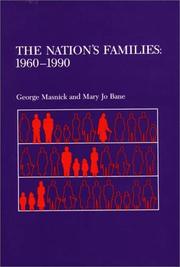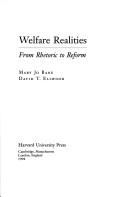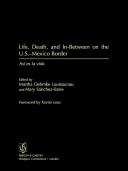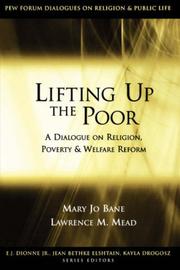| Listing 1 - 10 of 17 | << page >> |
Sort by
|
Book
Year: 1983 Publisher: Cambridge, Mass. National Bureau of Economic Research
Abstract | Keywords | Export | Availability | Bookmark
 Loading...
Loading...Choose an application
- Reference Manager
- EndNote
- RefWorks (Direct export to RefWorks)
Book
ISBN: 0465032435 0465032443 9780465032433 Year: 1975 Publisher: New York (N.Y.): Basic books,
Abstract | Keywords | Export | Availability | Bookmark
 Loading...
Loading...Choose an application
- Reference Manager
- EndNote
- RefWorks (Direct export to RefWorks)

ISBN: 0865690502 Year: 1980 Publisher: Boston Auburn House
Abstract | Keywords | Export | Availability | Bookmark
 Loading...
Loading...Choose an application
- Reference Manager
- EndNote
- RefWorks (Direct export to RefWorks)
Family --- -Households --- #SBIB:316.356.2H1134 --- Families --- Family life --- Family relationships --- Family structure --- Relationships, Family --- Structure, Family --- Social institutions --- Birth order --- Domestic relations --- Home --- Households --- Kinship --- Marriage --- Matriarchy --- Parenthood --- Patriarchy --- Statistics --- Statistics. --- Hedendaagse gezinsstudies: Noord-Amerika --- Social aspects --- Social conditions

ISBN: 0674017102 0674020480 9780674020481 9780674017108 Year: 2005 Publisher: Cambridge, Mass. : Harvard University Press,
Abstract | Keywords | Export | Availability | Bookmark
 Loading...
Loading...Choose an application
- Reference Manager
- EndNote
- RefWorks (Direct export to RefWorks)
Whether simply uneasy or downright hostile, the relation between religion and liberal democracy in this country has long been vexed and complex--and crucial to what America is and aspires to be. Amid increasingly contentious exchanges over fundamentalism, abortion rights, secularism, and pluralism, this book reminds us of the critical role that religion plays in the health and well-being of a democracy.
316:2 <73> --- 316:2 <73> Godsdienstsociologie--Verenigde Staten van Amerika. VSA. USA --- Godsdienstsociologie--Verenigde Staten van Amerika. VSA. USA --- Christian sociology --- Christianity and politics --- Church and social problems --- Christianity and social problems --- Social problems and Christianity --- Social problems and the church --- Social problems

ISBN: 0674949129 Year: 1994 Publisher: Cambridge Harvard University Press
Abstract | Keywords | Export | Availability | Bookmark
 Loading...
Loading...Choose an application
- Reference Manager
- EndNote
- RefWorks (Direct export to RefWorks)
BMLIK
#SBIB:316.8H00 --- #SBIB:316.8H40 --- #SBIB:35H437 --- Sociaal beleid: algemeen --- Sociaal beleid: social policy, sociale zekerheid, verzorgingsstaat --- Beleidssectoren: sociale zekerheid --- Aid to families with dependent children programs --- Public welfare --- welvaartstaten --- welvaartsstaten

ISBN: 0313003564 9780313003561 0897895681 089789569X 9798216976752 Year: 1999 Publisher: Westport, Conn. : London : Bergin & Garvey, Bloomsbury Publishing,
Abstract | Keywords | Export | Availability | Bookmark
 Loading...
Loading...Choose an application
- Reference Manager
- EndNote
- RefWorks (Direct export to RefWorks)
Public health --- Mexican Americans --- Public Health --- Poverty --- Socioeconomic Factors --- Sociology --- Social Problems --- Health --- Population Characteristics --- Hispanic Americans --- Environment and Public Health --- Medicine --- Social Sciences --- Health Care --- Health Occupations --- Ethnic Groups --- Disciplines and Occupations --- Anthropology, Education, Sociology and Social Phenomena --- Population Groups --- Persons --- Named Groups --- Public Health - General --- Health & Biological Sciences --- Person --- Indigenous Population --- Native-Born --- Natives --- Tribes --- Group, Population --- Groups, Population --- Indigenous Populations --- Native Born --- Population Group --- Population, Indigenous --- Populations, Indigenous --- Ethnicity --- Nationality --- Ethnic Group --- Nationalities --- Health Professions --- Health Occupation --- Health Profession --- Profession, Health --- Professions, Health --- Occupations --- Community-Based Distribution --- Contraceptive Distribution --- Delivery of Healthcare --- Dental Care Delivery --- Distribution, Non-Clinical --- Distribution, Nonclinical --- Distributional Activities --- Healthcare --- Healthcare Delivery --- Healthcare Systems --- Non-Clinical Distribution --- Nonclinical Distribution --- Delivery of Dental Care --- Health Care Delivery --- Health Care Systems --- Activities, Distributional --- Activity, Distributional --- Care, Health --- Community Based Distribution --- Community-Based Distributions --- Contraceptive Distributions --- Deliveries, Healthcare --- Delivery, Dental Care --- Delivery, Health Care --- Delivery, Healthcare --- Distribution, Community-Based --- Distribution, Contraceptive --- Distribution, Non Clinical --- Distributional Activity --- Distributions, Community-Based --- Distributions, Contraceptive --- Distributions, Non-Clinical --- Distributions, Nonclinical --- Health Care System --- Healthcare Deliveries --- Healthcare System --- Non Clinical Distribution --- Non-Clinical Distributions --- Nonclinical Distributions --- System, Health Care --- System, Healthcare --- Systems, Health Care --- Systems, Healthcare --- Science, Social --- Sciences, Social --- Social Science --- Medical Specialities --- Medical Specialties --- Medical Specialty --- Specialities, Medical --- Specialties, Medical --- Specialty, Medical --- Medical Speciality --- Speciality, Medical --- Health Workforce --- Hispanics --- Cuban Americans --- Latinas --- Latinos --- Puerto Ricans --- Spanish Americans --- American, Hispanic --- Americans, Cuban --- Americans, Hispanic --- Americans, Spanish --- Cuban American --- Hispanic --- Hispanic American --- Latina --- Latino --- Puerto Rican --- Spanish American --- Population Heterogeneity --- Population Statistics --- Characteristic, Population --- Characteristics, Population --- Heterogeneity, Population --- Population Characteristic --- Statistics, Population --- Labor Exploitation --- Social Exploitation --- Exploitation, Labor --- Exploitation, Social --- Exploitations, Labor --- Problem, Social --- Problems, Social --- Social Problem --- General Social Development and Population --- Factors, Socioeconomic --- High-Income Population --- Land Tenure --- Standard of Living --- Social Inequalities --- Social Inequality --- Factor, Socioeconomic --- High Income Population --- High-Income Populations --- Inequalities, Social --- Inequality, Social --- Living Standard --- Living Standards --- Population, High-Income --- Populations, High-Income --- Socioeconomic Factor --- Tenure, Land --- Economics --- Absolute Poverty --- Extreme Poverty --- Indigents --- Low Income Population --- Indigency --- Low-Income Population --- Indigent --- Low Income Populations --- Low-Income Populations --- Population, Low Income --- Population, Low-Income --- Populations, Low Income --- Populations, Low-Income --- Poverty, Absolute --- Poverty, Extreme --- Working Poor --- Community Health --- Environment, Preventive Medicine & Public Health --- Environment, Preventive Medicine and Public Health --- Health, Community --- Health, Public --- Preventive Medicine --- Education, Public Health Professional --- Chicanas --- Chicanos --- American, Mexican --- Americans, Mexican --- Chicana --- Chicano --- Mexican American --- Community health --- Health services --- Hygiene, Public --- Hygiene, Social --- Public health services --- Public hygiene --- Social hygiene --- Human services --- Biosecurity --- Health literacy --- Medicine, Preventive --- National health services --- Sanitation --- Federal Poverty Threshold --- Poverty Threshold, Federal --- Poverty Thresholds, Federal --- Thresholds, Federal Poverty --- Ethnicity. --- Mexican Americans. --- Mexico. --- Economic and Social Factors --- Social and Economic Factors --- Socioeconomic Characteristics --- Characteristic, Socioeconomic --- Socioeconomic Characteristic --- Federal Poverty Level --- Federal Poverty Levels --- Level, Federal Poverty --- Poverty Level, Federal --- Mexican-American Border Region --- Social conditions

ISBN: 0815707916 Year: 2003 Publisher: Washington, D.C. Brookings Institution
Abstract | Keywords | Export | Availability | Bookmark
 Loading...
Loading...Choose an application
- Reference Manager
- EndNote
- RefWorks (Direct export to RefWorks)
Social stratification --- Social problems --- United States of America
Digital
ISBN: 9780674020481 Year: 2009 Publisher: Cambridge, Mass. Harvard University Press
Abstract | Keywords | Export | Availability | Bookmark
 Loading...
Loading...Choose an application
- Reference Manager
- EndNote
- RefWorks (Direct export to RefWorks)

ISBN: 0674027051 0674038460 9780674027053 0674032306 9780674032309 9780674025141 0674025148 Year: 2007 Publisher: Cambridge, Mass. : Harvard University Press,
Abstract | Keywords | Export | Availability | Bookmark
 Loading...
Loading...Choose an application
- Reference Manager
- EndNote
- RefWorks (Direct export to RefWorks)
Christianity, not religion in general, has been important for American democracy. With this bold thesis, Heclo offers a panoramic view of how Christianity and democracy have shaped each other over the years, and how their relationship is changing in the present day. Responding to his challenging argument, Mary Jo Bane, Michael Kazin, and Alan Wolfe criticize, qualify, and amend it. The result is a lively debate about a momentous tension in American public life.
Democracy --- Christianity and politics --- Christianity and democracy --- Religious aspects --- Christianity. --- Christianity --- United States
Book
Year: 1983 Publisher: Cambridge, Mass. National Bureau of Economic Research
Abstract | Keywords | Export | Availability | Bookmark
 Loading...
Loading...Choose an application
- Reference Manager
- EndNote
- RefWorks (Direct export to RefWorks)
This paper examines the dynamics of poverty. Previous analyses of the dynamics of poverty have either examined only fluctuations in the male heads earnings or looked at the frequency of poverty periods over a fixed time frame. We argue that a more appropriate way to understand the dynamics of poverty is to define spells of poverty. Using this methodology we find that the majority of poor persons at any point in time are in fact in the midst of a rather long spell of poverty. The methodology also allows us to estimate the extent to which poverty spell beginnings and endings are associated with changes in income or changes in family structure. Less than 40 percent of poverty spell beginnings seem to be caused by a drop in the heads earnings,while 60 percent of endings occur when the head's earnings increase. As a result we argue that to understand the causes and potential remedies for poverty, researchers must focus on household formation decisions and on the behavior of so called secondary family members.
| Listing 1 - 10 of 17 | << page >> |
Sort by
|

 Search
Search Feedback
Feedback About UniCat
About UniCat  Help
Help News
News